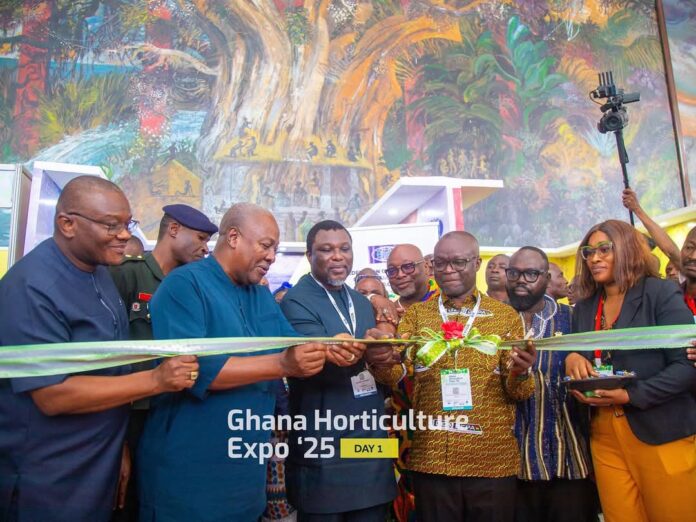The President of the Republic of Ghana, John Dramani Mahama has indicated Ghana’s position to lead Africa’s agriculture transformation during the opening of the Ghana’s biggest horticulture expo in Accra.
The expo is a landmark event that speaks to the promise of the land, the ingenuity of the Ghanaian people, and the power of shared purpose. “Today we gather not just to celebrate agriculture but to declare that Ghana is ready to grow, export, and lead Africa’s agricultural transformation.”
Speaking to the theme of the expo, “Innovate, Transform, Sustain: Driving Growth in Ghana’s Horticultural Sector,” the president emphasized his commitment to resetting the sector as part of his broader national reset agenda.
He indicated that the advocacy for youth involvement, innovation, and exports has helped shape the national conversation, especially around culture, exploration, and reconstruction and this would enhance the country’s goal of spearheading agriculture transformation in Africa.
“With year-round sunshine, fertile soils, water, and hardworking farmers, Ghana is already a global leader in exports and a growing force in tropical fruits and vegetables, but protection must give way to performance.”
“Hope must yield results. We must move from smallholder survival to value addition, international competitiveness, and youth-driven enterprise.”
He further said that many cannot access good storage or find fair markets, and a single field season can erase many years of effort. “This is not merely a technical challenge, it is a moral imperative.
We must ask ourselves: can a nation prosper if the very hands that feed it remain at its most neglected? Our answer today through this expo and our policies is resounding, you know.”
The president indicated that, in line with his renewed commitment, he is pleased to reaffirm his government’s flagship program, Feed Ghana, from 2025 to 2028, which personalizes the broader agriculture-for-economic-transformation agenda.
“Feed Ghana is a bold response to rural unemployment, food insecurity, and our dependence on imports,” he stated.
He further said that smart agriculture and farmer support centers will help deliver mechanization services to farmers, irrigation, climate-smart advisory, and digital extension services.
The agri-industrial zones and cold chain infrastructure will help reduce post-harvest losses and enhance export readiness. “These innovations are not promises; they are policy realities, designed to make Ghana’s agriculture investment-ready, inclusive, and globally competitive.”
“We’re also implementing a game-changing strategy, the 24-hour economy initiative, to unlock Ghana’s productive potential across all sectors. I’m pleased to announce that on July 1st, the 24-hour initiative policy will be ready to go into operation. This policy will provide a framework for continuous production, processing, and logistics in the future,” Mr. President affirmed.
He indicated that it will allow fresh produce like pineapples, mangoes, chilies, and herbs to move swiftly from the field to ports and onto international shelves, minimizing losses and maximizing value.
“I’m pleased to inform you that the Ministry of Trade, Agribusiness and Industry, and the Ministry of Transport are working together with the Ghana Revenue Authority, the Ghana Ports and Harbours Authority, the Ghana Shippers’ Council, and other stakeholders to soon declare the Tema and Takoradi ports as 24-hour ports,” the president further stated.
“It will not only be about working longer hours; it will be about building the infrastructure, the energy, the security, the transport, and the data platforms that enable round-the-clock agro-industrial activity.”
“It is a strategy of hope rooted in efficiency and scale. To stabilize our currency, we must earn more in foreign exchange, and one of the surest ways is to expand high-value horticultural exports. We are on that path, boldly and deliberately, and we shall work together with our exporters to be able to achieve this.”
“Ghana exports fresh produce to Europe, the Middle East, and Asia, and in 2024, our non-traditional exports exceeded $3.5 billion, with horticulture at the forefront. Our target is to exceed $10 billion by the year 2030, and this is possible. To do this, we must shift from aid to trade, and from dependence to dominance in the export value chain.”
The president said that under the African Continental Free Trade Area, the continent has a single market of 1.4 billion people. “We must not only trade more, but also produce more, and Ghana must lead in this effort. Imagine if Liberia grew fresh ginger, Ghana processed this ginger, and Kenya packaged it, and we exported it as one brand to Dubai.”
“This is the African economic ecosystem we must build: integrated, efficient, and product-self-reliant. Today, I am issuing a clear call to our development partners to invest with us in infrastructure, agriculture, and skills, not as donors, but as partners.”
“To our financial institutions, I say: be bold, de-risk this sector, and support agribusiness startups with real capital. To our youth and women, agriculture is not a fallback occupation, but an occupation of choice. Own it, live it, and thrive in it.”
The president indicated that it was a great privilege for him to join the opening of Africa’s Agricultural Expo 2025.
The President commended the organizers of the expo, notably the Federation of Associations of Ghanaian Exporters (FAGE), and the Ministry of Food and Agriculture.








